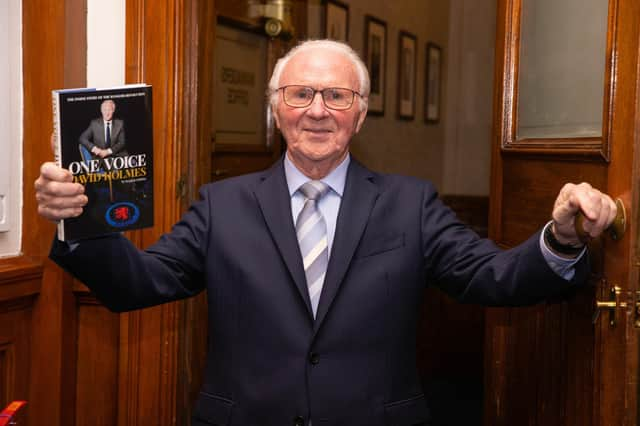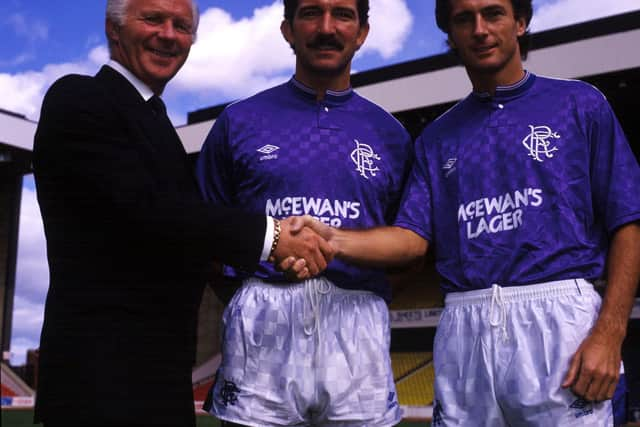David Holmes takes first step inside Ibrox since 1989 and lifts lid on time at Rangers - Graeme Souness, the pregnant pause and liability


There might not have been quite the same sense of anticipation as when he ushered Graeme Souness through the door of the same room 37 years earlier, but watching David Holmes make his entrance at Ibrox on Monday felt significant.
It was undoubtedly historic. Remarkably, the man who kicked off what is now routinely known as the Souness revolution, re-shaping Scottish football in the process, had not been back inside the stadium since he left the club in 1989.
Advertisement
Hide AdAdvertisement
Hide AdDavid Murray had taken over and there was an immediate change in style. Holmes stayed on for a short while but he wasn’t a fan. His loyalty had been to previous owner Lawrence Marlborough (Holmes remained an employee of the Lawrence Group during his time at Rangers) and, perhaps more importantly, to the Ibrox fans.


Souness was the man Holmes knew he needed to get them back on board, with crowds having slumped to sub 13,000. It was a nice idea, of course. Anyone would have wanted Souness, still one of the best midfielders in the world at the time, in their team. Crucially, Holmes wanted a two-for one-deal. A world-class player and a manager rolled into one.
“I had a shortlist of one,” says, Holmes, speaking at the launch of a book about his life in football. “He (Souness) didn’t know that. But I did. When I introduced my famous plan for Rangers, Lawrence said he wanted it to be a five-year plan. I said, ‘No, we’ve got to win the league in the first year’. I explained to him my plan was to win the title in my first year here, win one of the cups, play at least two rounds in Europe and get 40,000 people back he thought it was ambitious.”
It was ambitious. Holmes did not even know Souness, who was playing for Serie A side Sampdoria at the time. "I rang him and offered him the job and there was a pregnant pause," he recalls. "I thought he’d hung up on me. But he hadn’t. I told him he had all the attributes I needed there. He was a winner, he was a world-class player, he had a reputation.
"When he walked in the door of the Blue Room and I introduced him, I don’t think there was single Rangers supporter who didn’t have the hairs on the backs of their necks sticking up. He made it all happen. But the supporters came back and if that hadn’t happened it would never have taken off."
Souness agrees, although he is sure to give enormous credit to the joiner from Bonnybridge who convinced him these supporters were waiting for the spark. The crucial part played by Holmes became obscured amidst the bombast of the Murray years. Indeed, Souness is often more associated with that later regime. However, it was during Holmes' time when the likes of England skipper Terry Butcher, Chris Woods and Ray Wilkins signed. They all followed Souness, who remains amazed Holmes placed such faith in him.
“You know, what an enormous risk he took in giving someone with no experience of football management, just 33, a hothead who still saw himself as 23, all that responsibility to get on with it,” Souness is quoted as saying in Holmes' book. “So if my name is mentioned in that context of a revolution at Rangers, it should be his name that is mentioned first. No-one should ever forget what David Holmes did for Rangers Football Club.”
It seems some did forget. What other reason is there to account for Holmes never being invited back to Ibrox? His hair hasn’t turned white in the intervening period. It was that colour when he walked out aged just 54. Now 88, he remains immaculately well-turned out and as poised as ever.
Advertisement
Hide AdAdvertisement
Hide Ad“It is a bit nostalgic,” Holmes admits. “It is the first time I have been invited back here for 34 years. That is the bit that hurt. Anyway, that has passed…
"Over the years there have been a lot of stories told about the revolution that took place in the 1980s. But my story is the only story that matters as far as I am concerned.
“There were a lot of things said before I left about who signed who. I am not going to get into that. This book is purely and simply my association with the Rangers supporters. When I came here the revolution was about getting the Rangers supporters back to Ibrox. It was about getting the team ready to bring the crowds back to Ibrox. Before I came Rangers were playing for fourth and fifth in the league. Not first and second."
Holmes says he was brought in to do a specific job. "I came in here to make Rangers an asset, not a liability," he stresses. "It was a liability.” The club would become a liability again, of course. But that’s another story. Not one that’s dealt with in any detail in One Voice, written in conjunction with former The Scotsman sports writer, Stephen Halliday.
Holmes predates that humiliation. He is withering about the regime that took Rangers to the brink – and beyond. He wishes Scottish and Newcastle Breweries had contacted him before Marlborough sold out to Murray. They did afterwards, to say they would have bought the shares if they had known they were available. "Hindsight is a wonderful thing," he states pithily in his book.
Holmes left Ibrox on June 2, 1989, shortly after a Scottish Cup final defeat to Celtic. Butcher still called him 'Mr Chairman' but he was a shadow figure in the last few months as Murray implemented changes, including replacing Holmes as chairman. Holmes was still in his prime but other than short periods at hometown club Falkirk and Dundee, where he recruited Simon Stainrod, a cut-price Souness in many ways, he has remained out of the spotlight and kept his counsel, until now.
He might have walked out of Ibrox with little fanfare but should he return for a game, which he may, acclaim is guaranteed.
One Voice is available to purchase – price £25 – at www.davidholmesonevoice.co.uk